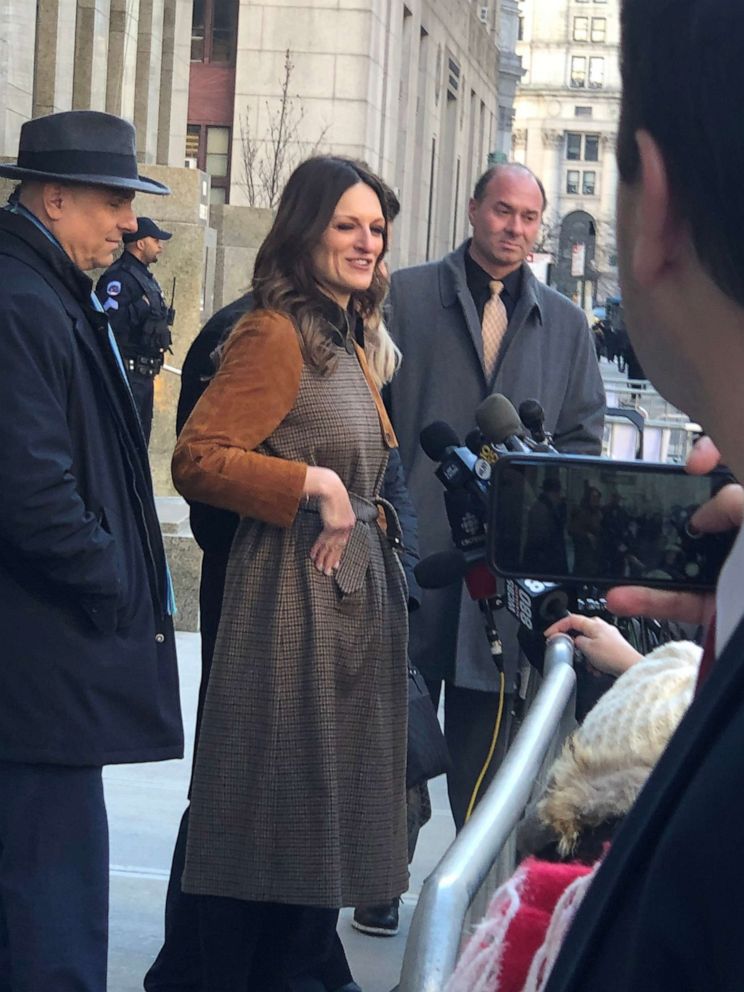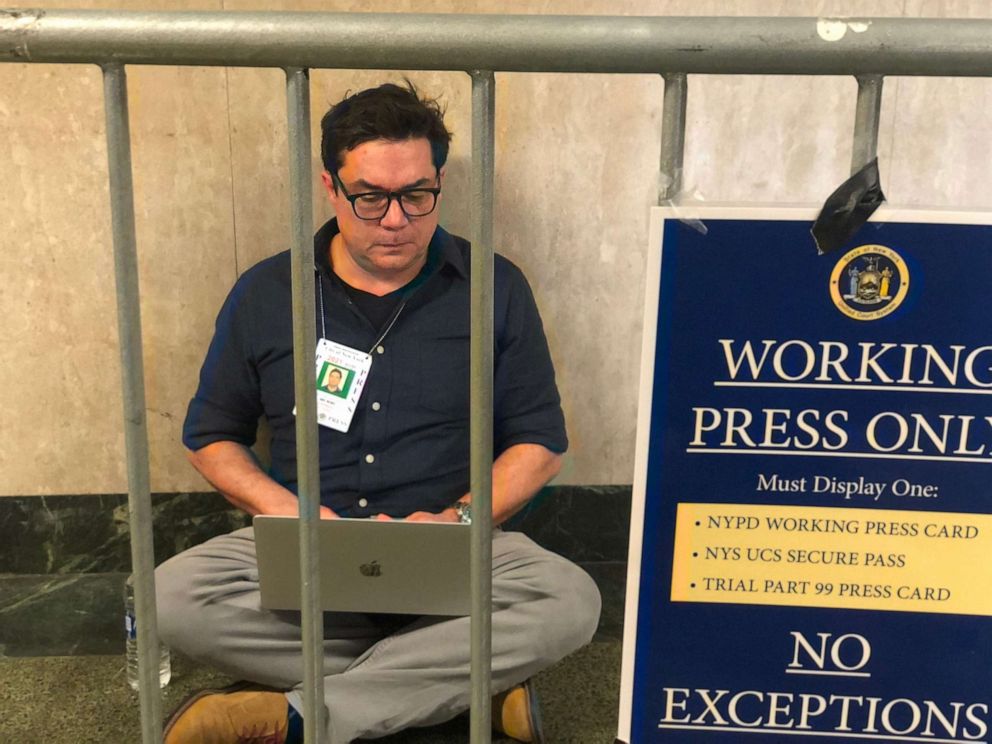Inside the Harvey Weinstein trial: Reporter's notebook
The trial was filled with the makings of a Hollywood blockbuster.
The People of the State of New York vs. Harvey Weinstein has been an epic production that ran nearly seven weeks -- underwritten by the state, cast by Manhattan prosecutors and starring perhaps the most recognizable accused sexual predator in the nation.
The trial has delivered all of the drama, suspense, bombshell plot twists, comic relief and cinematic sweep of a Hollywood blockbuster – mixed with the noir-ish darkness of disturbing allegations of violent degradation and depravity said to be lurking just beneath the surface.
Each day began around 4 a.m. as reporters lined up in the icy twilight outside the sprawling criminal courts complex at 100 Centre St. in lower Manhattan. After sunrise, the line started to creep forward in sections on the half-hour, a press army advancing in slow motion. Reporters passed through security at 8 a.m. and ascended to the 15th floor courthouse hallway to line up again inside aluminum pens lining the narrow courthouse hallway.

About 9:15 a.m., Weinstein rolled in on his wheeled walker flanked by a cadre of defense attorneys. Fifteen minutes later, Manhattan Supreme Court Justice James Burke appeared on the bench and began most mornings settling a variety of roiling disputes between the opposing counsel, ranging from serious accusations of misconduct to brief, noisy displays of mutual pique over perceived personal slights.

Another peculiar mainstay of Weinstein trial coverage was this: daily and without fail, a chorus of piercing sirens rose up from the streets below, ricocheted off three walls that form the pre-war courthouse’s towering entrance, and came screaming in through the open windows of the high-ceilinged courtroom.
The sound was so overwhelming that it regularly interrupted testimony, and multiple court microphones proved no match. At times, testimony simply halted for lengthy stretches until the noise subsided.
Inside the old courtroom, the temperature pinballed between two extremes: so cold that rows of reporters donned scarfs, ski hats and winter coats, or so hot they visibly perspired, wearily fanning themselves with flimsy press passes.
During testimony, court officers prowled the aisles like hunters, relentlessly scanning for cellphones. Hourly, court officers bellowed warnings to remind those packed into wooden rows in the gallery that even the sight of a cellphone in hand would trigger an immediate ejection. Every day or so the officers caught and removed a bewildered reporter new to the trial, a cautionary tale for the rest.
This vigilance took root the dramatic first day of jury selection, when a furious Burke threatened in a burst of hyperbole to jail Weinstein for life for repeatedly violating the cellphone ban.
Weinstein’s legal team fired back with a motion that cited the rebuke and other issues in seeking the judge’s recusal – a dicey move at the start of any criminal trial.
Before the day was out, Los Angeles prosecutors -- who had been probing Weinstein for two years -- indicted him on four new felony charges for alleged attacks on two women within the same week in February 2013. Weinstein has denied the charges.
That prompted the following morning’s cinematic spectacle of defense attorney Arthur Aidala holding aloft one New York newspaper front page after the next featuring Weinstein’s West Coast charges – part of a vigorous but unsuccessful bid for a “cooling off period” that could help prevent prejudicing the jury pool.
Hollywood to Montauk
Weinstein's trial has featured multiple celebrities and weeks of testimony peppered with Hollywood insider anecdotes and enough bold-faced names to pack the New York Post's Page Six’s gossip column for a week.
Reporters tapped out frenzied alerts to their editors when Victoria’s Secret supermodel Gigi Hadid, who studied criminal psychology at the New School, briefly appeared in the jury before being dismissed.
Actress Ellen Barkin attended the first day of testimony and sat in the back of the courtroom, mouthing gestures of support to her friend on the stand, "Sopranos" actress Annabella Sciorra, who testified Weinstein raped her nearly 30 years ago.
The next day, actress Rosie Perez took the stand, and broke down in tears when she acknowledged later sharing Sciorra’s account with MSNBC anchor Nicole Wallace.
The night Sciorra alleges she was raped, she testified, she and Weinstein had been out with a small group that included actress Uma Thurman.
Brazilian actress Talita Maia testified that Weinstein had referred her to Jose Padilla, the director of the blockbuster Netflix series “Narcos,” though the two never connected.
Actress Kara Young said that she first met Sciorra when both women and actor Gary Oldman stayed at filmmaker Julian Schnabel’s home in Montauk in the late 1980s and attended a nearby outdoor Paul Simon concert together.
Would-be defense witness Warren Leight -- who appears to have escaped testimony at least in part by retweeting high-profile, pro-prosecution tweets -- is a "Law & Order: SVU" show runner who says he penned an episode of the series based on the Weinstein case. The episode, called "I'm Gonna Make You a Star" was the 21st season premiere and first aired in Sept. 2019.

He also produced a 1993 Weinstein-backed movie "The Night We Never Met," starring Sciorra and Matthew Broderick. The back story of that production played into a key part of the trial testimony.
Leight has said he had written the part for Broderick’s wife, actress Sarah Jessica Parker, but she was unavailable for a reading Weinstein requested, so Weinstein insisted that Sciorra read the part, and then refused to bankroll the production unless she starred opposite Broderick.
The trial also shined a light on the seamier side of one of the nation’s most ruthless and competitive industries.
Crude remarks about accusers allegedly made by the defense’s first witness, producer Paul Feldsher, which were revealed under cross-examination, have been the target of angry Hollywood actresses for two weeks.
Feldsher called Weinstein’s appetite for professional success and women “voracious” (and later testified that he assumes Weinstein is a sex addict). He called Sciorra “an a------,” opined that “Well, the rape version [of Sciorra's account] got her a CAA agent, so there’s that,” and, with a line still ricocheting through the Hollywood Hills, wrote that “I think the dogpile of women who are suddenly bravely recalling repressed memories is hideous."
During the same time, according to testimony, Feldsher texted Sciorra:
"Bella, Meryl Poster [former president of television at The Weinstein Co.] asked me for your number. I should have asked you before I gave it, sorry, sorry about a bunch of stuff. Bewildered, too, can't imagine what the kids are like at this point. Would love to see a pic. Would love healing and peace and a friend back ... Current events are way too much for text but obviously acknowledgment goes to that awfulness."
Jekyll & Hyde
At the center of the trial is Weinstein himself.
Weinstein’s skin appeared perpetually pale and he wore sometimes ill-fitting suits with unkempt hair and orthopedic sneakers -- a sharp contrast to the pictures displayed in court of Weinstein in the 2000s and early 2010s wearing expensive, tailored suits and appearing well-groomed and healthy.
In court, Weinstein’s daily routine took shape over time. Each morning, an attorney handed the diabetic 67-year-old a fistful of candy and mints that he chomped on throughout the day. He spent long stretches of the trial writing notes on yellow legal pads, and breaks reading books. He displayed little visible emotion over weeks at the defense table.
During testimony he studied the women accusing him intently as they testified. He tried to wave to Perez when she identified him from the witness stand and offered a similar greeting to Sciorra, who stared straight back, ignoring the gesture.
But during each cross-examination, Weinstein turned his body fully 45 degrees, and studied his defense attorneys intently, appearing to soak up each gesture and facial expression as if he were casting a movie.
The accumulated accounts put forth by the six accusers painted a vivid picture of a powerful, abusive Hollywood titan who could swing suddenly between beguiling charm and volcanic rage -- between inspiring professional conversations about any aspect of cinema, and unspeakably degrading sexual demands.
"If he heard the word 'no,' it was like a trigger for him," Jessica Mann, who accused Weinstein of rape, testified. "It was like Jekyll and Hyde." (ABC News has not previously identified Mann, but the district attorney's office said she does not now object to being identified publicly).
The prosecution testimony included accounts of Weinstein bragging about having “guys with bats," bragging about having slept with famous actresses to convince lesser-well-known women to submit to his sexual demands, and unseemly accounts of him telling one accuser not to worry that he hadn’t used a condom because he had a vasectomy and reassuring another: “Don’t worry. I can’t have kids.” (He has five).
Conversely, the trove of emails entered into evidence suggested an unfailingly polite and courteous correspondent, given to small kindnesses and goofy signature phrases, like replying “Kool & the gang” in place of the word “cool.”
Witness testimony also suggested that one of the most powerful Hollywood figures in a generation, weighing in at nearly 300 pounds, was once terrorized by a Chihuahua named Peanut.
He denied this outside of court, replying “Do I look like I’m afraid of Chihuahuas?”




